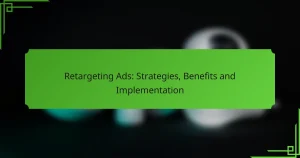Lead generation is a crucial aspect of business growth, encompassing various strategies designed to attract and convert potential customers. From content marketing to social media advertising, each approach offers unique advantages that can be customized to meet specific business objectives. By leveraging localized tactics and advanced tools, companies can enhance their lead generation efforts and effectively engage with their target audiences.
Google Ads vs Facebook Ads: Which Is Better and When to Use
When deciding between Google Ads and Facebook Ads, it’s essential to consider your marketing goals and audience engagement strategies. Google Ads excels in capturing high-intent searches, making it ideal for…
Lead Generation: Social Proof Impact
Social proof plays a crucial role in lead generation by fostering trust and enhancing a business’s credibility. By showcasing positive feedback, testimonials, and expert endorsements, companies can significantly influence potential…
Retargeting Ads: Strategies, Benefits and Implementation
Retargeting ads are a powerful marketing tool designed to re-engage users who have previously interacted with your brand. By utilizing user behavior data, these ads deliver personalized content that significantly…
Email Automation: Nurturing, Efficiency and Personalization
Email automation is a powerful tool for enhancing lead nurturing, allowing businesses to deliver personalized and timely communications to potential customers. By streamlining outreach and automating repetitive tasks, companies can…
Blog Posts: SEO, Structure and Call-to-Action
Creating blog posts that are optimized for SEO involves a strategic approach to keyword integration, content quality, and technical elements that boost visibility. By structuring your posts with clear introductions,…
Video Marketing: Engagement, Platforms and Metrics
Video marketing has become a crucial tool for engaging audiences and driving brand awareness. By creating content that resonates with viewers and utilizing the right platforms, marketers can enhance interaction…
Subject Lines: Engagement, Creativity and Clarity
Crafting compelling subject lines is essential for effective email marketing, as they must both capture attention and clearly communicate value. By balancing creativity with clarity, you can significantly boost open…
Lead Generation: Instagram for B2C Engagement
Instagram serves as a powerful tool for B2C lead generation, allowing businesses to engage potential customers through its visually-driven platform. By harnessing features like targeted ads, user-generated content, and influencer…
Lead Generation: Real-Time Engagement on Twitter
Generating leads through real-time engagement on Twitter is essential for building relationships and trust with your audience. By leveraging the platform’s features and implementing best practices, businesses can enhance their…
Landing Page Optimization: Design, Content and Conversion Rates
Landing page optimization is essential for maximizing conversion rates by refining design, content, and overall user experience. By implementing strategies such as A/B testing, effective call-to-action buttons, and high-quality visuals,…
What are the most effective lead generation strategies?
The most effective lead generation strategies include content marketing, email marketing, social media advertising, search engine optimization, and webinars. Each method has unique strengths and can be tailored to fit various business goals and target audiences.
Content marketing
Content marketing involves creating valuable and relevant content to attract and engage potential leads. This can include blog posts, eBooks, infographics, and videos that address the needs or interests of your target audience.
To maximize effectiveness, focus on quality over quantity. Aim for content that educates, entertains, or solves problems for your audience. Consistency in publishing and promoting your content is key to building trust and authority.
Email marketing
Email marketing remains a powerful tool for lead generation by allowing direct communication with potential customers. Building a targeted email list through sign-ups or lead magnets can help you nurture relationships and convert leads into customers.
Effective email campaigns should include personalized content, clear calls to action, and engaging subject lines. Monitor open and click-through rates to refine your approach and improve engagement over time.
Social media advertising
Social media advertising enables businesses to reach a broad audience through targeted ads on platforms like Facebook, Instagram, and LinkedIn. These ads can be tailored based on demographics, interests, and behaviors, making them highly effective for lead generation.
Consider using eye-catching visuals and compelling copy to drive clicks. Set a budget and test different ad formats to determine what resonates best with your audience. Regularly analyze performance metrics to optimize your campaigns.
Search engine optimization
Search engine optimization (SEO) is the practice of enhancing your website's visibility in search engine results. By optimizing your content for relevant keywords, you can attract organic traffic and generate leads without direct advertising costs.
Focus on both on-page and off-page SEO techniques, including keyword research, quality backlinks, and user-friendly website design. Regularly update your content to keep it relevant and maintain high search rankings.
Webinars and online events
Webinars and online events provide an interactive platform for engaging potential leads while showcasing your expertise. These events can cover industry trends, product demonstrations, or educational topics relevant to your audience.
Promote your webinars through email and social media to attract attendees. Ensure you have a clear agenda and follow up with participants afterward to convert interest into leads. Consider offering exclusive content or discounts to encourage sign-ups.
How can businesses implement lead generation in major US cities?
Businesses can effectively implement lead generation in major US cities by leveraging localized strategies that resonate with the community. This involves utilizing local SEO, engaging with community initiatives, and forming partnerships with local influencers to enhance visibility and attract potential customers.
Local SEO tactics
Local SEO tactics are essential for businesses aiming to attract customers in specific geographic areas. This includes optimizing your website for local keywords, creating a Google My Business profile, and ensuring consistent NAP (Name, Address, Phone number) information across online platforms. Focus on generating local reviews, as they can significantly impact your search rankings and credibility.
Consider using location-based content in your blog posts or service pages to better connect with your audience. For example, if you operate a coffee shop in San Francisco, write about local events or partnerships with nearby businesses to increase relevance.
Community engagement initiatives
Community engagement initiatives can foster strong relationships and enhance brand loyalty. Businesses should participate in local events, sponsor community activities, or host workshops that align with their mission. This not only raises awareness but also positions the business as a valuable community member.
For instance, a fitness studio might offer free classes in a local park or collaborate with schools to promote health and wellness. Such initiatives can lead to organic word-of-mouth referrals and a steady influx of leads.
Partnerships with local influencers
Forming partnerships with local influencers can amplify your lead generation efforts. Influencers often have established trust with their followers, making their endorsements particularly effective. Identify influencers whose values align with your brand and propose mutually beneficial collaborations.
For example, a local restaurant could partner with a food blogger to create a special menu item or host a tasting event. This not only drives traffic to the restaurant but also exposes the business to the influencer's audience, generating new leads.
What tools can enhance lead generation efforts?
Several tools can significantly boost lead generation efforts by streamlining processes and improving targeting. Utilizing the right software can help businesses capture, manage, and nurture leads more effectively.
HubSpot CRM
HubSpot CRM is a powerful tool for managing customer relationships and tracking leads throughout the sales funnel. It offers features like contact management, email tracking, and reporting, which help businesses understand their leads better.
One of the key advantages of HubSpot CRM is its user-friendly interface and integration capabilities with other marketing tools. This allows for seamless data flow and more effective lead nurturing strategies.
To maximize its potential, ensure that your team is trained on its features and regularly updates lead information to maintain accurate records.
Mailchimp for email campaigns
Mailchimp is a popular platform for creating and managing email marketing campaigns, which are essential for lead generation. It enables businesses to design visually appealing emails, segment audiences, and analyze campaign performance.
When using Mailchimp, consider personalizing your emails based on user behavior and preferences to increase engagement rates. A/B testing different subject lines and content can also help identify what resonates best with your audience.
Be mindful of compliance with regulations such as GDPR when collecting email addresses and sending marketing communications.
Google Ads for targeted advertising
Google Ads allows businesses to create targeted advertising campaigns that reach potential leads based on their search behavior. This platform is effective for generating immediate traffic and leads by placing ads in search results and across the Google Display Network.
To optimize your Google Ads campaigns, focus on keyword research to identify relevant terms that your target audience is searching for. Setting a clear budget and monitoring performance metrics can help you adjust your strategy for better results.
Consider using remarketing strategies to re-engage users who have previously interacted with your site, as this can significantly increase conversion rates.
What metrics should be tracked for lead generation success?
To measure lead generation success, focus on key metrics such as conversion rates, cost per lead, and return on investment. These metrics provide insights into the effectiveness and efficiency of your lead generation strategies, helping you optimize your efforts.
Conversion rates
Conversion rates indicate the percentage of leads that take a desired action, such as signing up for a newsletter or making a purchase. A higher conversion rate suggests that your lead generation tactics are effective in attracting and engaging potential customers.
To improve conversion rates, consider A/B testing different landing pages or call-to-action buttons. Aim for conversion rates between 2-5% for most industries, but this can vary based on the sector and target audience.
Cost per lead
Cost per lead (CPL) measures the total expense incurred to acquire a single lead. This metric helps you assess the financial efficiency of your lead generation campaigns. A lower CPL indicates a more cost-effective strategy.
To calculate CPL, divide your total marketing expenses by the number of leads generated. Aim for a CPL that aligns with your industry standards; for example, BGN 50-150 might be typical in Bulgaria, while in the US, it could range from USD 20-100 depending on the sector.
Return on investment
Return on investment (ROI) evaluates the profitability of your lead generation efforts by comparing the revenue generated from leads against the costs incurred. A positive ROI indicates that your strategies are yielding financial benefits.
To calculate ROI, use the formula: (Revenue from leads - Cost of lead generation) / Cost of lead generation. A healthy ROI is often considered to be at least 300%, meaning that for every BGN/USD spent, you should aim to earn three times that amount in revenue.
What are the prerequisites for a successful lead generation strategy?
A successful lead generation strategy requires a clear understanding of your target audience and a compelling value proposition. These elements help ensure that your efforts effectively attract and engage potential customers.
Clear target audience definition
Defining a clear target audience is crucial for effective lead generation. This involves identifying specific demographics, interests, and pain points of potential customers. Consider creating buyer personas that encapsulate these characteristics to guide your marketing efforts.
To refine your audience definition, analyze existing customer data and conduct market research. Look for trends in purchasing behavior and preferences to better understand who is most likely to convert. This targeted approach can significantly improve your lead generation outcomes.
Effective value proposition
An effective value proposition clearly communicates the unique benefits your product or service offers to potential leads. It should address the specific needs and challenges of your target audience, making it clear why they should choose your offering over competitors.
To craft a strong value proposition, focus on the key features and benefits that resonate with your audience. Use concise language and avoid jargon. Testing different versions can help identify which messaging is most compelling, so consider A/B testing to optimize your approach.
How does lead nurturing impact conversion rates?
Lead nurturing significantly enhances conversion rates by fostering relationships with potential customers over time. By providing relevant information and support, businesses can guide leads through the sales funnel, ultimately increasing the likelihood of a purchase.
Building trust with potential leads
Establishing trust is crucial in lead nurturing, as it encourages potential customers to engage with your brand. This can be achieved through consistent communication, transparency about your offerings, and showcasing customer testimonials or case studies. Trust-building efforts can lead to higher conversion rates, as leads feel more confident in their purchasing decisions.
Consider implementing strategies such as sharing valuable content, responding promptly to inquiries, and maintaining an active presence on social media. These actions can help create a positive perception of your brand and foster long-term relationships with leads.
Personalized communication strategies
Personalization in communication is vital for effective lead nurturing. Tailoring messages based on a lead's behavior, preferences, and demographics can significantly improve engagement and conversion rates. For example, sending targeted emails that address specific pain points or interests can make leads feel valued and understood.
Utilize tools like customer relationship management (CRM) systems to track interactions and gather data on leads. This information can help you segment your audience and craft personalized messages that resonate with each group, ultimately driving higher conversion rates.






